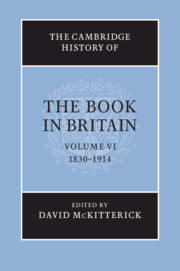Book contents
- Frontmatter
- Introduction
- 1 Changes in the look of the book
- 2 The illustration revolution
- 3 The serial revolution
- 4 Authorship
- 5 Copyright
- 6 Distribution
- 7 Reading
- 8 Mass markets: religion
- 9 Mass markets: education
- 10 Mass markets: children’s books
- 11 Mass markets: literature
- 12 Science, technology and mathematics
- 13 Publishing for leisure
- 14 Publishing for trades and professions
- 15 Organising knowledge in print
- 16 The information revolution
- 17 A place in the world
- 18 Second-hand and old books
- 19 A year of publishing: 1891
- 20 Following up The reading nation
- Bibliography
- Index
- Plate Sections
- References
13 - Publishing for leisure
Published online by Cambridge University Press: 28 March 2010
- Frontmatter
- Introduction
- 1 Changes in the look of the book
- 2 The illustration revolution
- 3 The serial revolution
- 4 Authorship
- 5 Copyright
- 6 Distribution
- 7 Reading
- 8 Mass markets: religion
- 9 Mass markets: education
- 10 Mass markets: children’s books
- 11 Mass markets: literature
- 12 Science, technology and mathematics
- 13 Publishing for leisure
- 14 Publishing for trades and professions
- 15 Organising knowledge in print
- 16 The information revolution
- 17 A place in the world
- 18 Second-hand and old books
- 19 A year of publishing: 1891
- 20 Following up The reading nation
- Bibliography
- Index
- Plate Sections
- References
Summary
The nineteenth and early twentieth centuries witnessed a transformation in the nature of British leisure habits. Under the impact of decreasing working hours, rising living standards and fundamental changes in technology and communication, all but the poorest sections of society were able to enjoy at least some of the new opportunities so assiduously nurtured by the growing leisure industry. In 1840, a piano was essentially a luxury item: by 1910 there was perhaps one instrument for every ten to twenty of the population. In 1888–9, an estimated 600,000 people watched the matches played by the twelve clubs in the nascent English Football League: by 1905–6, 5 million watched the League’s First Division games. In the 1830s, 50,000 people left the Channel ports for Europe each year: by 1913 that figure had risen to 660,000.
Particularly for sections of the middle class, always the major market for the ‘leisure book’ and thus the main focus of this chapter, the emergence of potential new pleasures was often problematic. While concerned as to how those beneath them in the social scale might use their leisure opportunities, and anxious to provide them with ‘rational recreation’, many were arguably even more worried about endangering their own morals or social status. Books and magazines were crucial tools in the subsequent process whereby individuals negotiated their way through the problems and possibilities of the new leisure landscape.
Keywords
- Type
- Chapter
- Information
- The Cambridge History of the Book in Britain , pp. 475 - 499Publisher: Cambridge University PressPrint publication year: 2009

